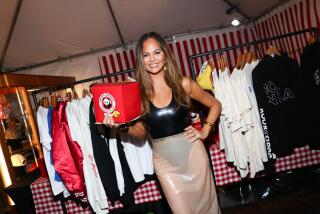BOOK REVIEW / FICTION : Some Unusual Food for Thought About Self-Indulgence : THE FOOD CHAIN, <i> by Geoff Nicholson</i> ; Overlook Press, $21.95, 184 pages
- Share via
Let us ease into a discussion of “The Food Chain” in a gingerly fashion, as though stepping, inch by inch, into a too hot bath. A gentle, palatable analogy will help make the transition easier: Think, if you will, of Pinocchio, that little fellow who so badly wanted to evolve from pine into flesh and blood, except that his baser instincts kept getting in his way.
He wanted quick fame, so he signed on as a novelty stage act instead of going to school. He wanted a good time--so he allowed himself to be taken to Pleasure Island with the other bad boys, where he was nearly done in by his pre-adolescent sybaritic yearnings.
He knew those cigars and sweets were bad for him, but he couldn’t stop himself. Were it not for Jiminy Cricket, Pinocchio would quite literally have made an ass of himself.
The cricket in this maniacal little caper is Butterworth, a Bible-reading chauffeur for a pompous, plump member of London’s mysterious Everlasting Club, where a party has been going on, nonstop, for more than 300 years.
It is a reveler’s delight: extravagant food and all manner of drink, available to the club’s tuxedoed members at any hour. When we meet Butterworth, he is on his way to the airport to pick up Virgil Marcel, the spoiled heir to the Golden Boy restaurant chain fortune and manager of his own Trimalchio, the hippest restaurant in Los Angeles.
Virgil doesn’t much care about becoming a real boy; he’s still at the Pleasure Island stage, developmentally, and never met a fancy meal, strange brew or attractive woman he didn’t like. When the club invites him for an all-expenses paid visit, he immediately says yes.
He quickly finds out that there can be too much of a good thing. Standard fare for Everlasting Club diners? “Staring up at him was a lurid, grotesque, mythological beast; a whole creature put together from real parts of animals.
It had a shark’s head, octopus tentacles, lobster claws, four duck’s feet, a goat’s tail, a torso made from rolled belly pork, and the whole thing was decorated with plumage, feathers from geese, eagles and emus.”
A nice bottle of Zambian Muscadet, and even the most devoted, hard-to-please gourmet starts to yearn for a hamburger, fries and a Coke.
Virgil is put off, but it turns out that everyone who is invited to join the club does. When he protests, up comes one hell of an evil coachman, Rose by name, who takes him on the eating and intercourse tour of the countryside, designed to make him feel fat and cooperative.
To say that Rose has a healthy sexual imagination barely begins to describe her life philosophy; sufficed to say, I will never again feel quite the same benign affection for cashew nuts. Virgil has met his match. He is on the brink of becoming just another belching upper-class ass when Butterworth figures out the real secret of the club and intervenes.
I will not give it away--because of course, this novel has no more to do with food and drink than did Luis Bunuel’s film, “The Discreet Charm of the Bourgeoisie.” Geoff Nicholson writes about class, about what men (and one particularly wacky woman, Virgil’s mom) will do to get ahead in this world. He writes, with a cold fury, about entitlement, about businessmen who believe that their profits can buy them the right to change society’s rules.
The members of the Everlasting Club eat Stilton stuffed with gooseberry and chili, “the tongues and brains of songbirds,” and some suspicious but very popular sausages simply because they can; they are the monied lords of their particular realm who can stroll up and down the food chain at their leisurely will.
Nicholson’s anger makes the comedy raw at times and suffocating at others. More than once I wanted to just put the book down and be done with its insistent madness. But reading “The Food Chain” is an unsettling experience, not unlike eating at the Everlasting Club. Common sense may say, “Enough.” Curiosity demands that the reader devour each page to find out exactly what the author wants to say.
Virgil does become a real boy (in the end he drives a Volvo, that immortal symbol of sense), but the others?
They continue their dastardly deeds, even if the book’s conclusion isn’t quite as tightly wound as the intricate setup.
“The Food Chain” is an acquired taste and a hell of a diet aid. Keep a couple of antacid tablets nearby if you decide to take a chance.
More to Read
Sign up for our Book Club newsletter
Get the latest news, events and more from the Los Angeles Times Book Club, and help us get L.A. reading and talking.
You may occasionally receive promotional content from the Los Angeles Times.







